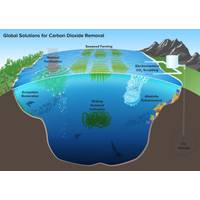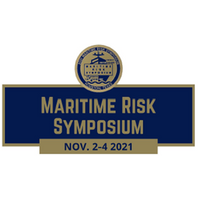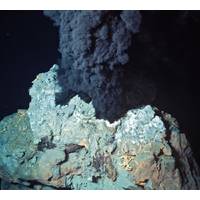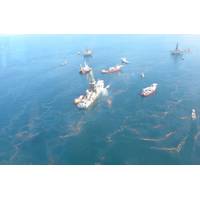Carbon Dioxide Removal (CDR) ... To Clear the Air, Look Beneath the Waves

Participants at the 26th United Nations Climate Change Conference (better known as COP26) late last year in Glasgow reiterated humanity needs to accelerate change in the coming decades to limit global warming to 1.5°C (or even to the 2°C as agreed up in the Paris Agreement). Meeting this goal by 2050, the formidable deadline agreed upon across environmental sectors to prevent dooming the planet, will require more than electric cars and veganism.
"Early Bird" Registration for 2021 Maritime Risk Symposium ends soon

The University of Houston’s College of Technology will host the 12th Annual Maritime Risk Symposium (MRS 2021), in collaboration with the National Academy of Sciences, from November 2-4, 2021, at the at the University of Houston’s Student Center-South.The Maritime Risk Symposium is an annual three-day conference in which government and maritime industry leaders, port representatives, researchers…
Registration opens for the 2021 Maritime Risk Symposium in Houston

The University of Houston’s College of Technology will host the 12th Annual Maritime Risk Symposium (MRS 2021), in collaboration with the National Academy of Sciences, from November 2-4, 2021, at the at the University of Houston’s Student Center-South.The Maritime Risk Symposium is an annual three-day conference in which government and maritime industry leaders, port representatives, researchers…
Technip USA Wins NOIA Safety Award
The National Ocean Industries Association (NOIA) presented Technip USA, Inc. with the 2016 NOIA Safety in Seas (SIS) Culture of Safety Award today during the association’s annual meeting in Washington, D.C. Technip USA won the Culture of Safety Award in recognition of Technip’s Pulse program, a global vehicle for HSE climate change through leadership and communication. “We are honored and delighted to have been selected as the winner of the NOIA 2016 Culture of Safety Award.
Research Shows Iron's Long Ocean Journey

A new study led by scientists at the Woods Hole Oceanographic Institution (WHOI) points to the deep ocean as a major source of dissolved iron in the central Pacific Ocean. Researchers found that iron can travel long distances, highlighting the vital role ocean mixing plays in determining whether deep sources of iron reach the surface-dwelling life that need it to survive. Iron is readily soluble in low oxygen regions at hydrothermal vent sites and along continental margins…
Boston Pipes Leak $90m in Fuel Yearly -Study
Boston's ageing pipeline network leaks about $90 million worth of natural gas each year, marking a sizeable financial loss and a threat to the environment, according to a study released on Thursday by Harvard researchers. The findings come as state energy officials struggle with a regional infrastructure shortfall that has left Massachusetts tight on winter heating fuel supplies during harsh cold snaps over the past three years.
Why we don't need better forecasts: Kemp
One of my first assignments as a newly-minted graduate in the late 1990s was to produce a 30-year forecast for the Bangladesh taka against the U.S. dollar on behalf of a client contemplating a multi-billion dollar investment. Even then, I realised this was not a sensible question. I wasn't even sure how much of Bangladesh would still be above sea level in 30 years, let alone the exchange rate.
Leaky Equipment, Not Fracking, Behind Tainted US Water -Study
The contamination of water supplies near U.S. shale gas fields appears to be the result of leaky cement wells and casings and not the controversial production technique of hydraulic fracturing, according to a study released on Monday. So-called "fracking" is a way of extracting natural gas from deep layers of rock using high-pressure fluid injections. The method has triggered a surge in U.S.
Preparing for the Next Big Solar Storm: Kemp
The probability of a solar storm striking Earth in the next decade with enough force to do serious damage to electricity networks could be as high as 12 percent, according to solar scientists. One such storm erupted from the surface of the Sun two years ago, on July 23, 2012. If it had been directed at this planet, it would have produced the worst geomagnetic storm in more than four centuries and caused extensive power problems.
EPA Mull Methane Regs for Oil & Gas Sector
The U.S. Environmental Protection Agency on Tuesday took a step toward a wider strategy to address climate change, releasing five technical papers that will help it decide whether or not to regulate methane emissions from the oil and gas sector. The "white papers" follow the White House's announcement in March of a plan to reduce methane emissions both domestically and internationally through incentive-based programs and the administration's existing authorities.
EPA Studies Whether to Regulate Methane from Oil and Gas
The U.S. Environmental Protection Agency on Tuesday took a step toward a wider strategy to address climate change, releasing five technical papers that will help it decide whether or not to regulate methane emissions from the oil and gas sector. The "white papers" follow the White House's announcement in March of a plan to reduce methane emissions both domestically and internationally through incentive-based programs and the administration's existing authorities.
Deepwater Horizon Spill Causes Fish Abnormalities

The National Oceanic and Atmospheric Administration (NOAA) reported that results to a new study conducted by a team of NOAA and academic scientists suggest that crude oil from the 2010 Deepwater Horizon disaster causes severe defects in the developing hearts of bluefin and yellowfin tunas. The findings, published in the Proceedings of the National Academy of Sciences on the 25th anniversary of the Exxon Valdez oil spill…